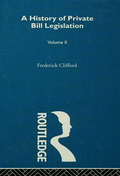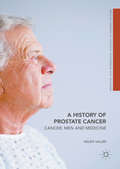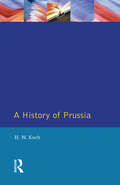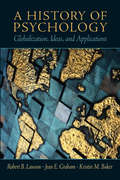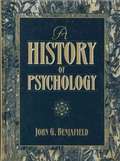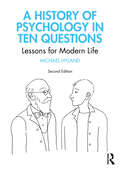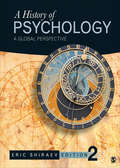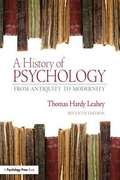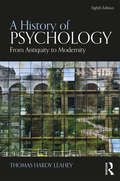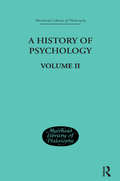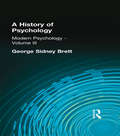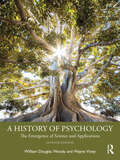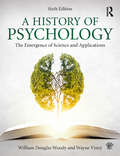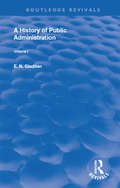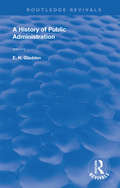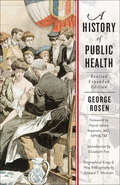- Table View
- List View
A History of Private Bill Legislation: [Vol 2 of 2 vols]
by Frederick CliffordFirst published in 1968. Routledge is an imprint of Taylor & Francis, an informa company.
A History of Private Life, Volume I: From Pagan Rome to Byzantium
by Arthur Goldhammer Paul VeyneDescribes public and private life during Roman times through the Middle Ages. What we consider public and private now was quite different throughout history.
A History of Professional Economists and Policymaking in the United States: Irrelevant genius (Perspectives in Economic and Social History)
by Jonathan S. FranklinOver the course of the twentieth century, professional economists have become a feature in the policymaking process and have slowly changed the way we think about work, governance, and economic justice. However, they have also been a frustrating, paradoxical, and in recent years, controversial fixture in American public life. This book focuses on the emergence and growth of professional economics in the U.S., examining the challenges early professional economists faced, which foreshadowed obstacles throughout the twentieth century. From the founding of the American Economic Association in 1885 to the depths of the Great Depression, this volume illustrates why some of the most optimistic and capable economic minds struggled to help smooth economic transitions and tame market fluctuations. Drawing on archival research and secondary sources, the text explores the emergence of professional economics in the United States and explains how economists came to be ‘irrelevant geniuses’. This book is well suited for those who study and are interested in American history, the history of economic thought and policy history.
A History of Prostate Cancer: Cancer, Men and Medicine (Medicine and Biomedical Sciences in Modern History)
by Helen ValierThis book offers a comprehensive and inclusive insight into the history of prostate cancer and its sufferers. Until recently, little practical help could be offered for men afflicted with the devastating diseases of the genitourinary organs. This is despite complaints of painful urination from aging men being found in ancient medical manuscripts, despite the anatomical discoveries of the European Renaissance and despite the experimental surgical researches of the eighteen and nineteenth centuries. As diseases of the prostate, including prostate cancer, came to be better understood in the early twentieth century, therapeutic nihilism continued as curative radical surgeries and radiotherapy failed. The therapeutic 'turn' came with hormonal therapies, itself a product of the explosive growth of U. S. biomedicine from the 1940s onwards. By the 1990s, prostate cancer screening had become a somewhat ubiquitous but controversial feature of the medical encounter for American men as they aged, which greatly influenced the treatment pathways and identity of the male patient: as victim, as hero, and ultimately, as consumer.
A History of Prussia
by H.W. KochIn little more than two centuries Prussia rose from medieval obscurity and the devastation of the Thirty Years War to become the dominant power of continental Europe. Her rulers rose from Electors to Kings, and from Kings to Emperors. It is a dramatic story, and H. W. Koch fills a major gap in English-language literature with this comprehensive account. It traces the origins and rise of the Prussian state from the thirteenth century to the causes and consequences of its incorporation into the German Empire.
A History of Psychology
by Robert B. Lawson Jean E. Graham Kristin M. BakerFor advanced undergraduate History of Psychology courses; also appropriate for graduate-level seminar courses in the discipline. Comprehensive and engaging in subject matter, this text integrates materials from religion (Judaism, Christianity, and Muslim as well as Buddhism and Confucianism), philosophy, and biology into the historical development of psychology. It includes a treatment of issues in the local and global society, an extensive look at women and minorities, and integrates overarching psychological principles, ideas, and applications that have shaped and will shape the global history of psychology. It highlights the interaction between psychology and the environmental context in which the discipline developed.
A History of Psychology
by John G. BenjafieldCombining an historical overview of psychology with a focus on advances in the 20th century, this text contains chapters on the history of developmental psychology, the history of methodology, humanistic psychology and cognitive psychology. It also considers the work of William James, Freud and Jung.
A History of Psychology in Ten Questions
by Michael HylandThis student-friendly book on the history of psychology covers the key historical developments and controversies in all areas of psychology, linking history to the present by focusing on ten conceptual issues that are relevant today. How did psychology become a science, and what kind of science did it become? How do psychologists measure and explain the fact that in some ways everyone is unique? Is psychoanalysis scientific? Why did cognitive science replace behaviorism? This book addresses all these questions and more, covering the whole range of psychology, from neuroscience and artificial intelligence to hermeneutics and qualitative research in the process. Drawing on the author’s experience of how to make the subject interesting for students, the book is structured around ten key questions that engage with all the core areas of psychology and the main schools of thought. Showing how each of the different approaches or paradigms within psychology differ not based on data but on assumptions, Michael Hyland provides an engaging introduction to debates from history and in contemporary society. Including boxed material on hot topics, historical figures, studies/experiments, and quirky facts, this is the ideal book for undergraduate students of psychology taking CHIPS and other history of psychology modules.
A History of Psychology in Ten Questions: Lessons for Modern Life
by Michael HylandThe second edition of this student-friendly book uses the history of psychology as a backdrop to provide a commentary on key historical developments and modern dilemmas, whilst encouraging readers to think about questions affecting life today. How do you know if something is true? How do you explain and control behaviour? What is the relation between psychology and physiology? How will artificial intelligence affect humanity? This book answers these and other questions by covering a wide range of topics in psychology, including neuroscience, personality, behaviourism, cognitive and humanistic psychology, qualitative methodology, inheritance and hermeneutics, all brought up to date with recent research. Drawing on the author’s own teaching, the book is structured around ten key questions where the history of psychology provides insight into modern life. Accessible for all readers, each chapter is also equipped with a ‘Lesson for modern life’ and nine ‘Essays and discussion topics’ so that readers can apply these ideas to their own thought practice. These provide interesting topics for discussion around issues that affect life and society. This insightful text encourages readers to question their own lives and the wider society by providing an engaging introduction to debates in history and contemporary society. The book is also the ideal resource for undergraduate students of psychology taking CHIPS and other history of psychology modules, as well as anyone generally interested in learning more about this fascinating subject.
A History of Psychology in Western Civilization
by Bruce K. Alexander Curtis P. SheltonThis book is a re-introduction to psychology. It focuses on great scholarly thinkers, beginning with Plato, Marcus Aurelius and St Augustine, who gave the field its foundational ideas long before better known 'founders', such as Galton, Fechner, Wundt and Watson, appeared on the scene. Psychology can only achieve its full breadth and potential when we fully appreciate its scholarly legacy. Bruce Alexander and Curtis Shelton also argue that the fundamental contradictions built into psychology's history have never been resolved, and that a truly pragmatic approach, as defined by William James, can produce a 'layered' psychology that will enable psychologists to face the fearsome challenges of the twenty-first century. A History of Psychology in Western Civilization claims that contemporary psychology has overemphasized the methods of physical science and that psychology will need a broader scientific orientation alongside a scholarly focus in order to fully engage the future.
A History of Psychology: A Global Perspective
by Eric ShiraevOffering a fresh, accessible, and global approach to the history of psychology, the fully revised Second Edition of Eric B. Shiraev’s A History of Psychology: A Global Perspective, provides a thorough view of psychology’s progressive and evolving role in society and how its interaction with culture has developed throughout history, from ancient times through the Middle Ages and the modern period to the current millennium. Taking an inclusive approach, the text addresses contemporary and classic themes and theories with discussion of psychology′s development in cultures and countries all too often neglected in overviews of the field. High-interest topics, including the validity of psychological knowledge and volunteerism, offer readers the opportunity to apply the history of psychology to their own lives.
A History of Psychology: A Global Perspective
by Eric ShiraevOffering a fresh, accessible, and global approach to the history of psychology, the fully revised Second Edition of Eric B. Shiraev’s A History of Psychology: A Global Perspective, provides a thorough view of psychology’s progressive and evolving role in society and how its interaction with culture has developed throughout history, from ancient times through the Middle Ages and the modern period to the current millennium. Taking an inclusive approach, the text addresses contemporary and classic themes and theories with discussion of psychology′s development in cultures and countries all too often neglected in overviews of the field. High-interest topics, including the validity of psychological knowledge and volunteerism, offer readers the opportunity to apply the history of psychology to their own lives.
A History of Psychology: Ancient and Patristic Volume I
by George Sydney BrettFirst published in 2002. Routledge is an imprint of Taylor & Francis, an informa company.
A History of Psychology: From Antiquity To Modernity, 7th Edition
by Thomas Hardy LeaheyProvides a narrative history of psychology. A History of Psychology: From Antiquity to Modernity begins tracking psychology from the development of folk psychology as the key adaptation of humans at the dawn of history. It then traces the Classical, medieval, and early modern periods to present day psychology. The text covers scientific, applied, and professional psychology.<P><P> Although theoretical and empirical arguments inside psychology about the nature of mind and behavior are not neglected, A History of Psychology shows how psychology's development has been shaped by social, economic, and political forces external to it, and, in turn, how the mature psychology of the late 20th century has begun to shape the society in which it arose. The text carefully examines how issues in psychology reflect and affect concepts that lie outside the technical concerns of psychology as a science and profession.<P> Upon completing this text, readers will be able to:<P> * Know the events in the history of scientific, applied, and professional psychology<P> * Understand how psychology,s development was shaped by external forces<P> * Describe how psychology has and continues to shape society<P>
A History of Psychology: From Antiquity to Modernity
by Thomas Hardy LeaheyA History of Psychology places social, economic, and political forces of change alongside psychology’s internal theoretical and empirical arguments, illuminating how the external world has shaped psychology’s development, and, in turn, how the late twentieth century’s psychology has shaped society. Featuring extended treatment of important movements such as the Enlightenment and the Scientific Revolution, the textbook approaches the material from an integrative rather than wholly linear perspective. The text carefully examines how issues in psychology reflect and affect concepts that lie outside the field of psychology’s technical concerns as a science and profession. This new edition features expanded attention on psychoanalysis after its founding as well as new developments in cognitive science, artificial intelligence, and behavioral economics. Throughout, the book strengthens its exploration of psychological ideas and the cultures in which they developed and reinforces the connections between psychology, modernism, and postmodernism. The textbook covers scientific, applied, and professional psychology, and is appropriate for higher-level undergraduate and graduate students.
A History of Psychology: Globalization, Ideas, and Applications
by Robert B. Lawson E. Doris Anderson Antonio Cepeda-BenitoGlobal, interdisciplinary, and engaging, this textbook integrates materials from philosophical and biological origins to the historical development of psychology. Its extensive coverage of women, minorities, and psychologists around the world emphasizes psychology as a global phenomenon while looking at both local and worldwide issues. This perspective highlights the relationship between psychology and the environmental context in which the discipline developed. In tracing psychology from its origins in early civilizations, ancient philosophy, and religions to modern science, technology, and applications, this book integrates overarching psychological principles and ideas that have shaped the global history of psychology, keeping an eye toward the future of psychology. Updated and revised throughout, this new edition also includes a new chapter on clinical psychology.
A History of Psychology: Mediaeval and Early Modern Period Volume II
by George Sydney BrettFirst published in 2002. Routledge is an imprint of Taylor & Francis, an informa company.
A History of Psychology: Modern Psychology Volume III
by George Sidney BrettFirst published in 2002. Routledge is an imprint of Taylor & Francis, an informa company.
A History of Psychology: The Emergence of Science and Applications
by Wayne Viney William Douglas WoodyThis seventh edition of A History of Psychology: The Emergence of Science and Applications traces the history of psychology from antiquity through the early twenty-first century, giving students a thorough look into psychology’s origins and key developments in basic and applied psychology. It presents internal, disciplinary history as well as external contextual history, emphasizing the interactions between psychological ideas and the larger cultural and historical contexts in which psychologists and other thinkers conduct research, teach, and live. It also has a strong scholarly foundation and more than 400 new references. This new edition retains and expands the strengths of previous editions and introduces several important changes. The text features more women, people of color, and others who are historically marginalized as well as new sections about early Black psychology and barriers faced by people who are diverse. It also includes expanded discussions of eugenics and racism in early psychology. There is new content on the history of the biological basis of psychology; the emergence of qualitative methods; and ecopsychology, ecotherapy, and environmental psychology. Recent historical findings about social psychology, including new historical findings about the Stanford Prison Experiment, Milgram’s obedience research, and Sherif’s conformity studies, have also been incorporated. Continuing the tradition of past editions, the text focuses on engaging students and inspiring them to recognize the power of history in their own lives, to connect history to the present and the future, and to think critically and historically.
A History of Psychology: The Emergence of Science and Applications (Mysearchlab Series 15% Off Ser.)
by Wayne Viney William Douglas WoodyA History of Psychology: The Emergence of Science and Applications, Sixth Edition, traces the history of psychology from antiquity through the early 21st century, giving students a thorough look into psychology’s origins and key developments in basic and applied psychology. This new edition includes extensive coverage of the proliferation of applied fields since the mid-twentieth century and stronger emphases on the biological basis of psychology, new statistical techniques and qualitative methodologies, and emerging therapies. Other areas of emphasis include the globalization of psychology, the growth of interest in health psychology, the resurgence of interest in motivation, and the importance of ecopsychology and environmental psychology. Substantially revised and updated throughout, this book retains and improves its strengths from prior editions, including its strong scholarly foundation and scholarship from groups too often omitted from psychological history, including women, people of color, and scholars from outside the United States. This book also aims to engage and inspire students to recognize the power of history in their own lives and studies, to connect history to the present and the future, and to think critically and historically. For additional resources, consult the Companion Website at www.routledge.com/cw/woody where instructors will find lecture slides and outlines; testbanks; and how-to sources for teaching History and Systems of Psychology courses; and students will find review a timeline; review questions; complete glossary; and annotated links to relevant resources.
A History of Public Administration: Volume I: From the Earliest Times to the Eleventh Century (Routledge Revivals)
by E. N. GladdenOriginally published in 1972, Gladden argues that, when more and more attention is being given to the history of particular activities, to specialist as opposed to general history, there is a case for attempting to redress the balance between government and administration. This book offers an investigation of the administrative context of earlier ages and raises the suspicion that administration, like human nature, may not have varied very much since human society began. It is an attempt to provide a highly selective introductory history of this vast subject, with special emphasis on its public aspects, including chapters on Medieval Europe, the Middle East, Early American Civilizations and more.
A History of Public Administration: Volume II: From the Eleventh Century to the Present Day (Routledge Revivals)
by E.N. GladdenFirst published in 1972, the object of this work is to provide a history of public administration from earliest times up to the present day. The survey, necessarily selective, is broadly based, ranging from the prehistoric cave-dwellers to twentieth-century administration. Viewpoints are varied to bring in the several levels and spheres of operation; namely, directional and personnel, organizational and technical, biographical and theoretical. The work is in two volumes. Volume One covers the main civilizations of the Middle East, India, China and the West up to the eleventh century A.D. Volume Two, continuing the same field, extends its scope to include the civilizations of pre-Columbian America, the colonial empire and international administration. At a time when the scope of public administration is continually expanding, and more research is being carried out into administrative problems, much can be learned from the administrative lessons of the past. Dr. E.N. Gladden, a retired civil servant, has designed this work to integrate a vast and diverse subject.
A History of Public Banking in Portugal in the 19th and 20th Centuries (Financial History #28)
by Pedro LainsThis book examines the history of what became one of Portugal’s largest banks, the Caixa Geral de Depósitos. The bank was founded in 1876 by the state to run public deposits, and evolved into a savings bank, catering for both public and private deposits. Its history goes beyond the history of banking, as it ties in with the role of the state in the banking sector and financial markets. The book weaves in and out of different political and international contexts, following the many changes of the Portuguese political regime and of its interactions with the national and international economy. The most important lesson from the study is that publicly owned institutions can compete successfully with the private sector when they simultaneously cater for the interests of policy makers as well as those of the public, in this case, the depositors. The history of the Caixa Geral de Depósitos therefore shows how the state of a peripheral economy is capable of successfully managing a large financial institution when the right set of incentives is in place. This work will be a valuable resource for researchers and students of financial and economic history at both the advanced undergraduate and postgraduate levels. It will also provide interesting insights for practitioners in the financial sector.
A History of Public Health
by George RosenGeorge Rosen's wide-ranging account of public health's long and fascinating history is an indispensable classic.Since publication in 1958, George Rosen's classic book has been regarded as the essential international history of public health. Describing the development of public health in classical Greece, imperial Rome, England, Europe, the United States, and elsewhere, Rosen illuminates the lives and contributions of the field's great figures. He considers such community health problems as infectious disease, water supply and sewage disposal, maternal and child health, nutrition, and occupational disease and injury. And he assesses the public health landscape of health education, public health administration, epidemiological theory, communicable disease control, medical care, statistics, public policy, and medical geography.Rosen, writing in the 1950s, may have had good reason to believe that infectious diseases would soon be conquered. But as Dr. Pascal James Imperato writes in the new foreword to this edition, infectious disease remains a grave threat. Globalization, antibiotic resistance, and the emergence of new pathogens and the reemergence of old ones, have returned public health efforts to the basics: preventing and controlling chronic and communicable diseases and shoring up public health infrastructures that provide potable water, sewage disposal, sanitary environments, and safe food and drug supplies to populations around the globe.A revised introduction by Elizabeth Fee frames the book within the context of the historiography of public health past, present, and future, and an updated bibliography by Edward T. Morman includes significant books on public health history published between 1958 and 2014. For seasoned professionals as well as students, A History of Public Health is visionary and essential reading.
A History of Pythagoreanism
by Carl A. HuffmanThis is a comprehensive, authoritative and innovative account of Pythagoras and Pythagoreanism, one of the most enigmatic and influential philosophies in the West. In twenty-one chapters covering a timespan from the sixth century BC to the seventeenth century AD, leading scholars construct a number of different images of Pythagoras and his community, assessing current scholarship and offering new answers to central problems. Chapters are devoted to the early Pythagoreans, and the full breadth of Pythagorean thought is explored including politics, religion, music theory, science, mathematics and magic. Separate chapters consider Pythagoreanism in Plato, Aristotle, the Peripatetics and the later Academic tradition, while others describe Pythagoreanism in the historical tradition, in Rome and in the pseudo-Pythagorean writings. The three great lives of Pythagoras by Diogenes Laertius, Porphyry and Iamblichus are also discussed in detail, as is the significance of Pythagoras for the Middle Ages and Renaissance.
